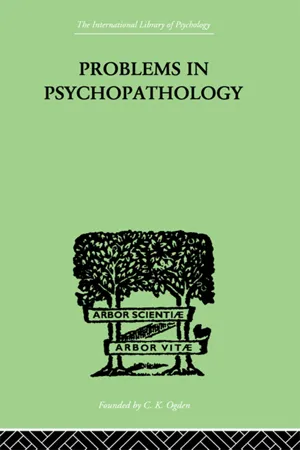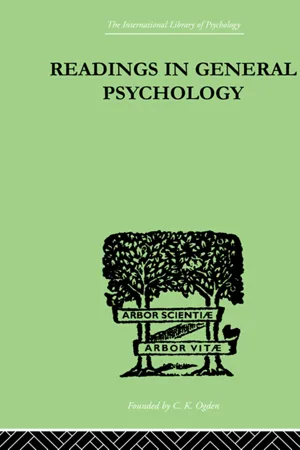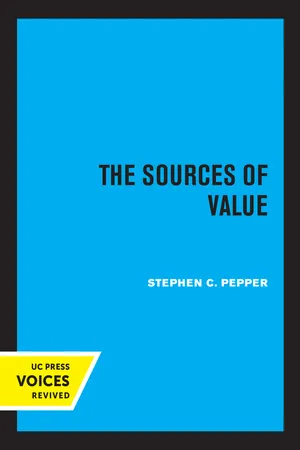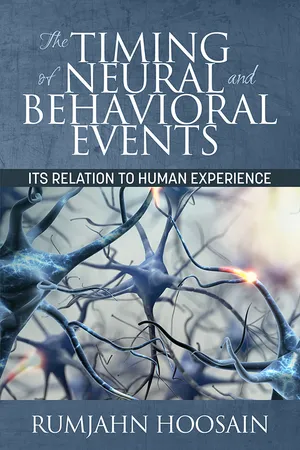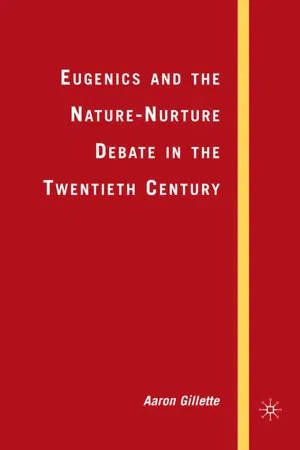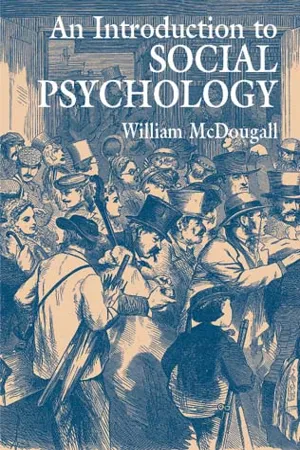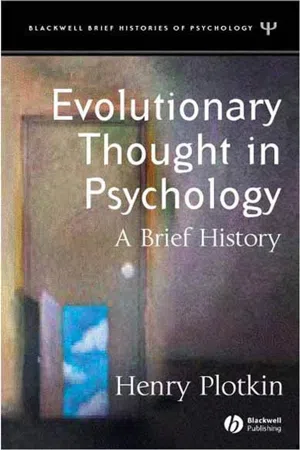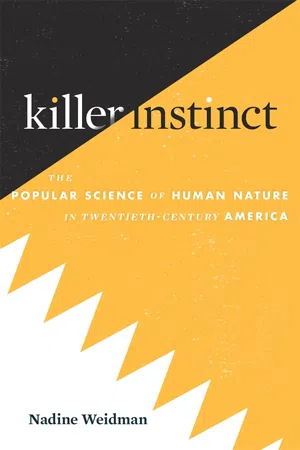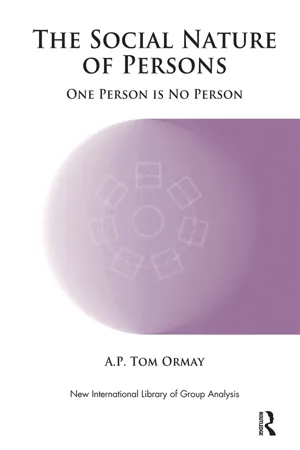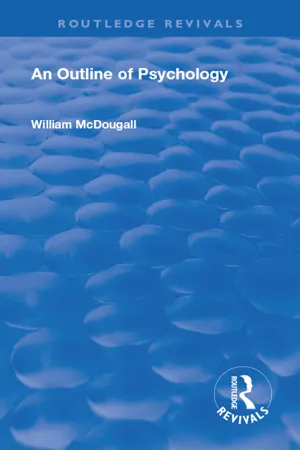Psychology
Instinct Theory
Instinct theory proposes that behavior is driven by innate, biological instincts that are inherited and characteristic of a species. These instincts are thought to guide and motivate behavior, such as survival instincts for food, shelter, and reproduction. Proponents of instinct theory believe that these instincts are universal and play a fundamental role in shaping human behavior.
Written by Perlego with AI-assistance
Related key terms
1 of 5
11 Key excerpts on "Instinct Theory"
- eBook - ePub
- T.W. Mitchell(Author)
- 2013(Publication Date)
- Routledge(Publisher)
Some writers regard as instinctive every form of co-ordinated bodily movement which needs little or no practice for its accurate execution, the co-ordination being innately determined. Others restrict the instincts to purposive actions which are accurately performed without any previous experience or learning. Others, again, confine the term to the impulses towards satisfaction of fundamental needs of the organism, such as self-preservation and reproduction. One of the most noteworthy contributions to the problems of instinct, in recent years, is that which is found in the writings of Professor McDougall, and the sense in which he uses the term is perhaps that in which it is used by the majority of psychologists in this country. He defines an instinct as “an innate disposition which determines the organism to perceive (to pay attention to) any object of a certain class, and to experience in its presence a certain emotional excitement and an impulse to action which finds expression in a specific mode of behaviour in relation to that object”. 1 That is to say, all instinctual activity has three sides : a sensory or perceptual side, an emotional or affective side, and a motor or executive side. Some object is perceived or some situation arises which excites the instinct-disposition, and this excitement is accompanied by some specific emotion and by a felt impulse to act in some specific way. The specific form of behaviour is sometimes regarded as the essential part, but the accompanying emotional experience is inseparably connected with the problem of instinct. Dr. McDougall describes fourteen human instincts, the activity of each of which is accompanied by a specific form of emotional excitement. For example, the instinct of escape or flight is accompanied by the emotion of fear, the instinct of combat by the emotion of anger, the instinct of repulsion by the emotion of disgust - eBook - ePub
- Paul & Iliffe Halmos, Halmos, Paul & Iliffe, Alan(Authors)
- 2013(Publication Date)
- Routledge(Publisher)
The Status of InstinctF. V. SMITH Professor of Psychology, Universiry of DurhamIntroduction
IN ordinary speech and psychological literature, the term instinct has been used in several senses; but the term only has value in explanation if it indicates conditions or organizations which are causally related to behaviour. To claim that birds taken to Italy or Newfoundland in closed cages find their way back within a few weeks to the west coast of Britain, by "instinct" does not contribute to the understanding or the explanation of the phenomenon, unless by this term we describe demonstrable conditions or organizations which can be shown to be causally related to this particular event.Very often the word "instinct" is used as a descriptive term indicating the existence of one or several contributing causes, the nature of which is not specified. Thus the efficient behaviour of animals in novel circumstances, the successful anticipations of the scrum-half, the housewife, and the stockbroker may be attributed to "instinct"; but such usages can be associated with ignorance of the causes of the behavioural event and can be conducive to the cessation of inquiry. Common sense would suggest that some special organization is brought into action between the perception of the problem situation and the strik ingly efficient behaviour; but it is not enough to dismiss the challenge to explanation by a word, unless by that word, precise organizations and their functions are indicated.Much of the vogue of the concept of instinct in the literature of the first half of the twentieth century derived from the writings of William McDougall, and in particular from his Introduction to Social Psychology (1908), which has to date appeared in thirty editions, and An Outline of Psychology (1923) now in its seventh edition. In the symposium entitled "Instinct and Intelligence" (Stout, G. F., and others, 1910 ) it was clear that opinions differed as to the way in which an instinct was thought to function; but by 1941, several British psychologists could seriously debate in symposium the issue, "Is the Doctrine of Instincts Dead?" (Burt, C., and others, 1941, 1943 - eBook - PDF
- Stephen C. Pepper(Author)
- 2023(Publication Date)
- University of California Press(Publisher)
It would be accepted without question if there were agreement on what constitutes an instinct. But since agreement is lacking, we must seek our own conclusion from the evidence available. 2. THE REFLEX THEORY OF MOTIVATION In an earlier passage (chap. 3, §4) we ventured to define in- stinct as either a chain reflex or an innate drive. In regard to the chain reflex there would be no issue. The reflex school, 1 which ordinarily denies instincts, simply would not call a chain reflex technically an instinct. They would merely call it a chain reflex. But they would have to deny that there were innate drives. Of course, there is a sense in which the reflex school is making a very important point. Just as the cell is the anatomical unit for describing in detail any part of an organism's body, so the reflex is the physiological unit for describing in detail any act of an organism's behavior. All purposive behavior as well as all the rest of an animal's behavior can be physiologically analyzed, at least in theory, into sets of reflexes. An instinctive drive theory does not deny that. The issue arises at the next level. The reflex school seems to deny that there is anything between a chain reflex structure and the conditioning of innately unconnected reflexes. In opposition, the instinct school affirms that docile animals including man are endowed with a number of innately connected sets of reflexes or drives, not so tightly connected from start to finish as a chain reflex sequence, nor yet so loose and unconnected as the reflex school's conception of a mere repertory of innately isolated reflexes would require. The evidence against the reflex school seems to be very great and steadily increasing. The likelihood that the characteristic impulse patterns of hunger, thirst, and sex and their comple- mentary quiescence patterns are results of learning through conditioning is becoming weaker the more these are studied. Even the notion of prenatal conditioning will not suffice. - eBook - PDF
- Rumjahn Hoosain(Author)
- 2010(Publication Date)
- Information Age Publishing(Publisher)
To end this section on instinct, we might note again the issue of timing of events. James’s characterization of instinctive behavior as without fore- sight (but ceased to be “blind” after once repeated) contrasted with Mc- Dougall’s (1908) purposeful psychology partly in terms of when anticipa- tion of the outcome of action took place. It is earlier with McDougall. Also, the postulation of instinctive action in ethology is often based on the ab- sence of prolonged learning. But Hebb (1949) observed that, “Much that we attribute to instinct, because no prolonged learning is evident, might thus be due to learning that needs only a few seconds for its completion” (p. 113). In other cases, as shown in Kuo’s work, relatively long periods of development is involved. Finally, there is some consensus in the various theories discussed previously that variability in behavior or experience is due to the complexity either of instincts, past experiences, or environmen- tal situations at play at any one time. Herrnstein (1972/1998) considered that some of the key concepts of nativism exemplified by Instinct Theory had been absorbed intact by envi- ronmentalists or behaviorists. One example is the idea of impulse, such as in James’s theory of instinct, which was then considered in terms of drive in some behavioristic theories and eventually became modern notions of mo- tivation in cognitive psychology. We shall look at this development in what follows by comparing Hull and Dulany. Another could be the idea of fixed motor patterns or fixed action patterns in ethology. In earlier behavioristic accounts, response to a stimulus situation was also taken to be automatic, without conscious mediation or flexibility. But the significant difference is that mechanisms involved in instincts, such as innate releasing mechanism, are thought to be “present before all experience” (Lorenz, 1973, p. 63), while stimulus-response associations in behavioristic theories are learned. - James McGaugh(Author)
- 2012(Publication Date)
- Academic Press(Publisher)
Instinct is not easily defined. To this writer, the instinct notion contains two similar, but distinct, kernel hypotheses. The first is that an instinct is an unlearned behavior or behavior characteristic. The second is that instincts are genetically determined. Despite the antiquity of these hypotheses, both are in cur-rent use as distinguishing characteristics of the instincts. The first hy-pothesis is embodied in a statement by Rock, Tauber, and Heller (1965) concerning the perception of movement by newborn guppies and praying mantises: The fact that apparent movement is seen only at certain speeds and spatial separations, that it can be seen by a variety of species, as well as by decorti-cated animals, has suggested to many that the effect is innate. Nevertheless, it is possible that such perception of movement is learned on the basis of ex-perience with real movement. The second hypothesis was included by Michael (1961) in a discussion of the sexual behavior of female cats: (this behavior) . . . is geneti-cally coded into the activity of the central nervous system. Several years before Rock et al. and Michael employed these hypoth-eses as quasiexplanatory concepts in the analysis of behavior, both of the kernel hypotheses had been analyzed and found inadequate. Beach (1955), for example, took issue with the use of a dichotomy, any dichot-omy (e.g., learned-unlearned) in the classification of behavior. He stated the case as follows: This (dichotomy) forces psychologists to deal with a two class system, and such systems are particularly unmanageable when one class is defined solely in negative terms, that is in terms of the absence of certain characteristics that define the other class. It is logically indefensible to categorize any behavior as unlearned unless the characteristics of learned behavior have been thoroughly explored and are well known.- A. Gillette(Author)
- 2007(Publication Date)
- Palgrave Macmillan(Publisher)
assumed that, since humans were animals, behavior patterns observed in the higher mammals must have some presence in human behavior as well. This includes instinctual behaviors. Essentially, instincts were thought to be inheritable behavior patterns that manifested themselves under certain conditions, and generally increased the animal’s adaptation to its environ- ment. In his 1872 book Expression of Emotions in Man and Animals, Darwin explained that those behaviors common to both the higher mam- mals and to man very likely had an instinctual component. Instincts orig- inated in animals lower down the evolutionary ladder, in response to common environmental challenges. These instincts were inherited by succeeding species, including human beings. 1 Darwin was revered by evolutionary psychologists and eugenicists in much the same way as an Old Testament prophet. Thus, the directions he advocated for future biological work were accorded unique status. Darwin’s sanction of the belief in instinctual human behavior inspired a fierce devotion to the concept in the early evolutionary psychologists. They endeavored to determine which human behaviors had an instinctual basis. In 1890, the great American philosopher and psychologist William James endorsed the belief that humans possessed instinctual behavior. James believed that instincts were set behavior patterns triggered by expos- ing the organism to specific environmental stimuli. Like other behaviors, instincts evolved through natural selection, and were nature’s “solutions” to particular survival and reproductive problems. James asserted that humans had even more instincts than did other animals. These included instincts that bound people together, such as love and parenting; and those that provided protection against threats, such as pugnacity and fear of common dangers (e.g., heights, spiders, and so on). 2 James’s student Granville Stanley Hall discussed human instinct at greater length.- eBook - ePub
- William McDougall(Author)
- 2013(Publication Date)
- Dover Publications(Publisher)
Observation of animals of any one species shows that all members of the species seek and strive toward a limited number of goals of certain types, certain kinds of food and of shelter, their mates, the company of their fellows, certain geographical areas at certain seasons, escape to cover in presence of certain definable circumstances, dominance over their fellows, the welfare of their young, and so on. For any one species the kinds of goals sought are characteristic and specific ; and all members of the species seek these goals independently of example and of prior experience of attainment of them, though the course of action pursued in the course of striving towards the goal may vary much and may be profoundly modified by experience. We are justified, then, in inferring that each member of the species inherits the tendencies of the species to seek goals of these several types.Man also is a member of an animal species. And this species also has its natural goals, or its inborn tendencies to seek goals of certain types. This fact is not only indicated very clearly by any comparison of human with animal behaviour, but it is so obvious a fact that no psychologist of the least intelligence fails to recognise it, however inadequately, not even if he obstinately reduces their number to a minimum of three and dubs them the “prepotent reflexes” of sex, fear, and rage. Others write of “primary desires,” or of “dominant urges,” or of “unconditioned reflexes,” or of appetites, or of cravings, or of congenital drives, or of motor sets, or of inherited tendencies or propensities ; lastly, some, bolder than the rest, write of “so-called instincts.” For instincts are out of fashion just now with American psychologists ; and to write of instincts without some such qualification as “so-called” betrays a reckless indifference to fashion amounting almost to indecency. Yet the word “instinct” is too good to be lost to our science. Better than any other word it points to the facts and the problems with which I am here concerned.The hormic psychology imperatively requires recognition not only of instinctive action but of instincts. Primarily and traditionally the words “instinct” and “instinctive” point to those types of animal action which are complex activities of the whole organism ; which lead the creature to the attainment of one or other of the goals natural to the species ; which are in their general nature manifested by all members of the species under appropriate circumstances ; which exhibit nice adaptation to circumstances ; and which, though often suggesting intelligent appreciation of the end to be gained and the means to be adopted, yet owe little or nothing to the individual’s prior experience.hq - eBook - PDF
Evolutionary Thought in Psychology
A Brief History
- Henry Plotkin(Author)
- 2008(Publication Date)
- Wiley-Blackwell(Publisher)
They also taught lessons on the misuse of science that were not always heeded. Classical Ethology One reason for the collapse of the notion of instincts in psych-ology in the early part of the twentieth century was that it was so conceptually weak, if not entirely empty (chapter 4). Part of that weakness was a result of hopeless inconsistencies in the way different people thought of the problem. One strong line of thought, which begins with Greek philosophers half a millen-nium before the birth of Christ, is that whilst humans are rational and conscious beings, beasts are not and their behavior is entirely inborn. This became consistent with subsequent Christian teach-ing according to which it is only humans who have an afterlife and whose fate therein depends upon our ability to distinguish with our intellects between right and wrong. Reason is in the service of moral choices that other animals do not have to make. Descartes’ beast machine (chapter 2) which cannot think and has no language drew the same distinction between ourselves and all other animals. Instincts, it was held, owed nothing to experience, where experience was framed within the concept of rational powers of learning and reasoning. The sensationalists adopted an almost opposite view. By way of their empiricist origins they were reluctant to accept the existence of instincts in humans, and when they did they laid emphasis on these being acquired and not inborn. Lamarck, and hence Spencer too, in an odd way reconciled these opposing positions by arguing that instincts are the acquired habits of previous generations. Darwin’s partial acceptance of the Lamarckian inheritance of acquired characters resulted in his own, uncharacteristic, inconsistency as to just what the relationship between intelligence and instinct is (chap-ter 3). - eBook - PDF
Killer Instinct
The Popular Science of Human Nature in Twentieth-Century America
- Nadine Weidman(Author)
- 2021(Publication Date)
- Harvard University Press(Publisher)
1 INTRODUCTION The Beast Within An unprejudiced observer from another planet, looking upon man as he is today, in his hand the atom bomb, the product of his intelligence, in his heart the aggression drive inherited from his anthropoid ancestors, which this same intelligence cannot control, would not prophesy long life for the species. —Konrad Lorenz, On Aggression I nside every human being, beneath a thin veneer of civilization, dwells a beast. If we want to understand ourselves, we must un-derstand that beast. Millions of years ago, as our hominid ancestors evolved into fully human physical form, our minds and behavior evolved as well. But rather than becoming infinitely flexible, potentially adaptable to any culture or circumstance, a tabula rasa or blank slate, human nature took on a fixed form. A suite of psychological mechanisms and behav-ioral tendencies became just as characteristic of our species as our upright stature and expansive braincase. And just as our physical form resembles those of our closest animal relations, we must look to animal behavior to understand our own. This is the message of the popular sciences of human nature, a genre that over the past several decades has become a familiar and ubiquitous part of American culture. From sociobiology in the 1970s and 1980s to evolutionary psychology since the 1990s, this genre has purported to ex-plain why humans are the way they are by referring to the hard core of human nature, genetically encoded and largely unchangeable. 1 Socio-biology emphasizes the genetic basis of social behaviors shared among animals and humans, while evolutionary psychology speaks of mental or emotional traits or propensities. But both sciences lean on the claim that K I L L E R I N S T I N C T 2 human nature, as it evolved in response to the rigors of the ancient envi-ronment, continues to shape our behavior in the present. And both sci-ences stress human commonality rather than intergroup or interindi-vidual differences. - eBook - PDF
The Social Nature of Persons
One Person is No Person
- A.P. Tom Ormay(Author)
- 2018(Publication Date)
- Routledge(Publisher)
Like timid children looking up to their fathers, once self-assured critics now looked up devotedly to those in whom they saw power or even brutality and from whom they sought protec-tion. . . . The lesson to be learned here may well be this: in peacetime, let’s not be ashamed to recognise the primitive man or even the animal; it’s no shame to have such close ties to what is natural. In wartime, let’s not deny our finest cultural values like so many cowards, and let’s not compromise them more than absolutely necessary. (p. 268) From a practical point of view we might ask: how can we understand any psychic problem relating to the body, or the fact that we live in a world of objects, if we do not apply Instinct Theory? We might try symbols or metaphors, but how do they affect us? In any kind of a reply we have to refer to some kind of force that makes sense in terms of the mind as well as the body. We need to understand what happens when we have a thought or a feeling and a part of our body is moved. Movement comes from force: we observe its effect in the physical world and call it energy; in the psychic world, we experience the same force as feeling, or emotion. Some colleagues, who try to practise psychoanalysis without Instinct Theory, nevertheless use words like libido, or feeling, or affect in such a way that they imply some kind of moving force. 6 THE SOCIAL NATURE OF PERSONS Some people talk about instinct, others call it drive or motivation. Recently, we have been talking about the influence the genes have on the personality. Freud thought it important to include Instinct Theory in psychoanalysis because he wanted to create a psychology that contains a systematic relationship to the body. By systematic, he meant a body with its reflexes, nervous system, viscera, and evolutionary character being not an afterthought, but an essential part of the human picture. - eBook - ePub
- Willam McDougall(Author)
- 2018(Publication Date)
- Routledge(Publisher)
It is a principal feature of this book that, in this all-important matter of the explanation and understanding of human behavior or conduct, it holds “common sense” to be in the right; and it holds many of the psychologies and philosophies of the past to be in the wrong, because they have rejected the common-sense procedure and offered in its place a variety of fantastic theories. We have seen already what some of these theories are. There is (i) the theory of reflexes and “conditioned reflexes,” which was elaborated by Herbert Spencer and has recently been furbished up again as “behaviorism.” There is (2) the theory of “ideas,” which, when applied to the explanation of conduct, takes the form of the “ideo-motor” theory, and asserts that this mysterious unintelligible something called an “idea” is a motive force as well as a mosaic of bits of “consciousness.” There is (3) the pleasure-pain theory which dominated British psychology and social philosophy for several generations, under the name of “psychological hedonism.” It asserts that pleasure and pain, or the desire for pleasure and the aversion from pain, are the motives of all human conduct. And, not content with the utter inconsistency of this theory with a thousand obvious facts, many of its exponents have combined with it the obscurities and absurdities of the “idea theory” and have asserted that “the idea of pleasure” or “the idea of pain” is the motive of all action. Then (4) there is the theory which explains all human action by saying it is due to “The Will;” though what “The Will” is and what is the relation of the “willed” acts of human adults to the behavior of animals and children it has never made clear. There is (5) the theory that all human conduct is the expression of “Reason”; and this theory is in the same position as the theory of “The Will”; and both are remnants of the Faculty Psychology of the eighteenth century. Lastly, there is (6) the theory that all human conduct is determined by “The Unconscious.” This, the latest and most fashionable fad in psychology, is a new development by medical psychologists of the theory of Schopenhauer and Ed. von Hartmann. All these are interesting exhibits in the museum of psychological antiquities and curiosities. The beginner may safely stand at a little distance and view them with the respectful curiosity due to every historically interesting object, while still preferring explanations of the common-sense type. In this book it will be my chief endeavor to show him how the common-sense explanation may be refined and made more definite and systematicInstincts and EmotionsWe have seen that, in face of the behavior of such an animal as the dog, we are apt to invoke explanations of two kinds. When his behavior is like our own, and seems to express any emotion such as we ourselves experience, we are content to ascribe it to that emotion; as when we say that the animal is impelled by anger or fear or curiosity or disgust. When it is very unlike our own and expresses no emotion that we can recognize by its expressions, we ascribe it to Instinct. And, in either case, we recognize that a little dose of intelligence may modify the impulsive power of emotion or of instinct. On contemplating the behavior of birds, we are more ready to invoke Instinct and less ready to infer Emotion; for the greater difference of bodily structure and mode of life renders our recognition of their emotions more difficult and ambiguous than in the case of the mammals nearest to ourselves. Yet common sense and the literary tradition do not hesitate to ascribe to the birds emotions not utterly different from our own. The insects being still more remote from us in structure and mode of life, common sense invokes Instinct only; for, though it does not fail to see signs of emotions in insect behavior, it rightly judges these to be so unlike our own that they cannot safely be given the same names and cannot profitably be assigned as the motive powers of their actions.
Index pages curate the most relevant extracts from our library of academic textbooks. They’ve been created using an in-house natural language model (NLM), each adding context and meaning to key research topics.
